Intermarkets' Privacy Policy
Donate to Ace of Spades HQ!
aceofspadeshq at gee mail.com
Buck:
buck.throckmorton at protonmail.com
CBD:
cbd at cutjibnewsletter.com
joe mannix:
mannix2024 at proton.me
MisHum:
petmorons at gee mail.com
J.J. Sefton:
sefton at cutjibnewsletter.com
Wednesday Morning Rant
Mid-Morning Art Thread
The Morning Report — 3/4/26
Daily Tech News 4 March 2026
Tuesday Overnight Open Thread - March 3, 2026 [TRex]
Goodnight Cafe
Quick Hits
Trump: I Told Scott Bessent to Cut Off All Trade with Spain
Netflix Head Ted Sandaros Tried to Convince GOP Congressmen His Company Wasn't a Woke Groomer Propaganda Outfit.
Then Legislators Visited Netflix HQ, and Found Tampons in the Men's Bathroom.
Plus: Megyn Kelly, The Chameleon Princess of Pop Politics
Jim Sunk New Dawn 2025
Jewells45 2025
Bandersnatch 2024
GnuBreed 2024
Captain Hate 2023
moon_over_vermont 2023
westminsterdogshow 2023
Ann Wilson(Empire1) 2022
Dave In Texas 2022
Jesse in D.C. 2022
OregonMuse 2022
redc1c4 2021
Tami 2021
Chavez the Hugo 2020
Ibguy 2020
Rickl 2019
Joffen 2014
maildrop62 at proton dot me
Saturday Evening Movie Thread 08-17-2019 [Hosted By: TheJamesMadison]
Ingmar Bergman
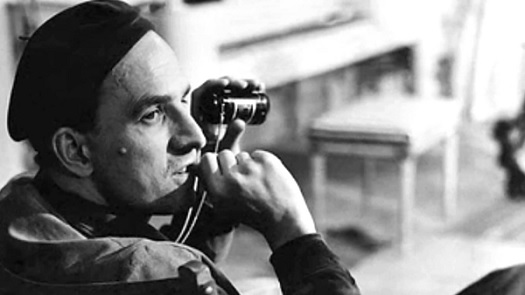
Ingmar Bergman was one of the greatest of filmmakers. He stands next to the likes of Orson Welles, John Ford, Alfred Hitchcock, Charlie Chaplin, Stanley Kubrick, Akira Kurosawa, and Jean Renoir as the titans of the art form. He made some of the most iconic images in cinema of the 20th century, and now I'm going to force you people to talk about him.
As a Man

Born to a Lutheran minister, Bergman was raised in a strictly religious household. He chaffed under the rules of the house (which were quite strict) as well as at school. He entered the world of theater in college and never really left. He started working for the Swedish film industry as a writer of studio melodramas and soon began to direct them. He reached international acclaim in the mid 1950s and eventually retired from filmmaking in the 1980s.
He was married five times, had numerous affairs with his actresses, and fathered nine children. He called himself an inattentive father and carried an aversion to children his whole life. He struggled with the idea of God and His relationship to Bergman for decades, eventually finding some level of answer in the 1960s. He was, by all accounts, a warm and joyful man. His sets were often described as places of great fun and laughter, even on movies that are considered dour. He died in 2007 at the age of 89.
As a Filmmaker
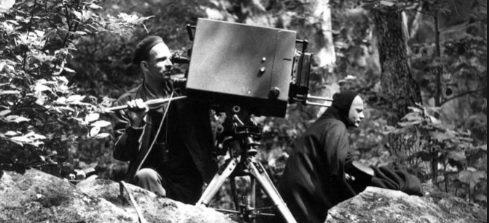
There are really three, largely distinct, periods in Bergman's career. The first could be called the Studio Period, where he made studio melodramas. The second could be called the God Period where he was obsessed with questions related to the Almighty, in particular his silence towards Bergman. The third could be called the Woman Period (though most of his films across his whole career dealt with women primarily) where he dug deeply into women's psyches and their relationships to men and to other women.
Bergman started by making melodramas in the late 40s. His first film, Crisis, has a couple of moments but is largely a failure as a film. He worked studio films for several years, writing some, directing the writing of others the rest of the time, and he steadily grew his voice. By the he made Summer Interlude in 1951, and especially Summer with Monika in 1953, his style was clearly defined, but his movies weren't terribly successful. When they reached America, especially Monika, they were butchered into sex farces that included spliced in footage from different movies to spice them up. Instead of getting penetrative dramas about they psyches of young people, American distributors were offering a different kind of penetrative.
The international film community finally took notice of Bergman as a director to be watched with 1955's Smiles of a Summer Night, a delightful romp in the style of a French sex comedy about three couples who start the movie in the wrong pair and end it in the right one. Bergman's fame shot up instantly, and he became a darling of the art film world. In the following decade he would produce some of his most famous and enduring works from The Seventh Seal to The Virgin Spring and the Silence Trilogy. Completing the second part of that trilogy (Winter Light) marked a turning point in the thematic thrust of Bergman's work, and he most readily announced it with Persona in 1966, the experimental-like film about two women becoming one. It was there that Bergman began to more closely focus on women and relationships while also beginning the process of moving more towards television.
Two of his greatest works from this late period were made first for Swedish television. Scenes from a Marriage is a five-hour film about the dissolution and reconstitution (in a different form) of a seemingly happy middle class marriage. Reportedly, divorces skyrocketed in Sweden after it was shown. Fanny and Alexander tells one of the only child focused stories Bergman ever told. It is a heavily fictionalized version of Bergman's own youth including an exacting Lutheran minister father figure (step-father instead of father).
It was also in this period that Bergman had tax troubles with the Swedish government and self-exiled himself to the European continent where he made what is widely considered his worst movie, The Serpent's Egg starring David Carradine in pre-war Germany.
He spent the final two decades of his professional life mostly working in theater, seemingly having gotten everything he needed from the cinematic medium. He did, however, revisit the medium one final time in 2003 with a sort-of sequel to Scenes from a Marriage called Saraband.
Actors and Actresses
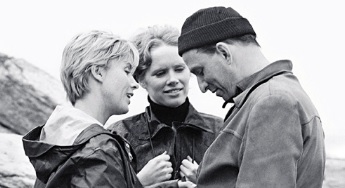
Oftentimes directors are classified by what their focus seems to be. George Lucas is a special effects director. Tim Burton is a design director. Ingmar Bergman was an actor's director first and foremost. He wasn't interested in pushing the technical boundaries of the medium (though he was happy to embrace new things as they came along). Instead he told small stories focused tightly on people, usually in isolated places that resembled Faro, the island he called home for the last few decades of his life. His start was in the theater and the Swedish film industry was never that large, so he tended to use the same actors repeatedly.
I'd say that there are three primary actors and three primary actresses across his filmography. The three actors are Max Von Sydow, Gunnar Bjornstrand, and Erland Josephson. The three actresses are Harriet Andersson, Bibi Andersson, and Liv Ullmann. Bergman had affairs with all three actresses and Liv Ullmann gave birth to one of his nine children.
The advantage of this approach is the level of trust that Bergman and the actors shared with each other. Bergman knew he could write difficult parts, and the actors knew they would have directorial support to make intelligent decisions based on the material Bergman had written. He grew to allow improvisation from the actors he had known for years as both actors and director found the story during filming.
Visuals
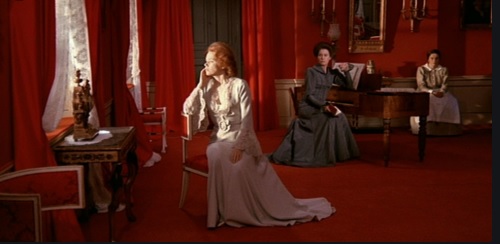
Cinema is a visual medium and Bergman is occasionally accused of not doing much with it, instead relying on close-ups overmuch. That's untrue. He did use close-ups a lot of the time because he often had actors in highly emotional moments and the best way to communicate that feeling to an audience is to use the actor's face. However, his framing was top notch. There's a famous type of shot that he used frequently that showed two actors talking to each other but the audience can see both faces at the same time. The one in the background will look straight at the one in the foreground, but the one in the foreground looks off into the distance. It's usually used when the one in the background is confronting the one in the foreground and can't face what they are being accused of.
His primary cinematographer through most of his career was a man named Sven Nykvist. He was responsible for the stark imagery of death and the Middle Ages in The Seventh Seal, the luscious reds of Cries and Whispers, and the deep field photography of Fanny and Alexander.
Lighting was dynamically used frequently to throw some characters into shadows and others into stark light, commanding light as theatrically and effectively as Orson Welles. Short version: Bergman's films are universally good to look at.
Writing

There's a rule in movie writing in particular that says, "Show don't tell." Bergman's movies often seem to break this "rule" as his characters very often speak about their feelings to one another. (The Virgin Spring is a large counter-example, but it was written by someone else.) This would seem to say that Bergman wasn't taking advantage of the medium, but while it is a tendency that originates from the theater, it still works in cinema. The focus of his films is on performance and emotion, so having Liv Ullmann list the reasons she's grown to hate Erland Josephson in Scenes from a Marriage it's compelling on its own, but you also have Erland turning around, reacting, and firing back at the same speed.
Another element that sets Bergman's writing apart is the fact that his characters lie a lot. Well, maybe lie is a bit strong, but they certainly speak untruths to each other. They are at emotional highs or lows that distort their view of the world and lead misunderstandings and intentional hurts. The most prominent example is in The Passion of Anna where the title character, played again by Liv Ullmann, lies extensively about her background, leading her partner, played by Max Von Sydow, to leaving her. So what we end up seeing is the act of lying and the reaction to that. It's not merely exposition.
The other side of his writing is that Bergman wrote characters, particularly women, magnificently. They have strong inner lives. They are intelligent. They have clear wants and desires, and those wants and desires often conflict with those around them. I think of Summer with Monika where the titular Monika, played by Harriet Andersson, wants nothing more than to spend her life at ease, but Harry, her beau, begins to break away from that when they have a child. He sees the importance of responsibility while Monika refuses it, creating the conflict between them that leads to their ultimate separation. Both characters, Harry and Monika, are so well drawn that the conflict becomes both inevitable and tragic at the same time. As Harry end the movie, alone with his child, there really doesn't seem to have been any other way the specific relationship could have ended.
One of the Greatest
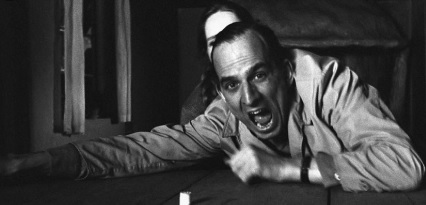
Stanley Kubrick made Fear and Desire. Billy Wilder made Buddy Buddy. Francis Ford Coppola made Jack. Ingmar Bergman made The Serpent's Egg.
No artist is perfect, even the greatest. So, even though Bergman's filmography isn't universally great, he's still one of the greatest filmmakers to have ever lived.
From 1951 to 1982, he made some of the most indelible films with some of the most famous images in cinema history. He touched in different genres, pulled out fantastic performances from his actors regularly, and illuminated different aspects of the human condition through the medium. His showed tragic portraits of youthful love (Summer Interlude), explored the relationship between man and a silent God (The Seventh Seal and The Silence Trilogy), and delved deeply into the nature of the relationships between men and women (Scenes from a Marriage). He also illuminated different aspects of the female psyche (Brink of Life) and gave us a heartbreaking portrait of childhood (Fanny and Alexander).
His movies looked fantastic from beginning to end. They were consistently populated with believable, breathing characters. Even his stumbles are at least interesting.
The reason I'm writing this is because I just finished the Criterion Collection's collector's set of thirty-nine Bergman films. It's not comprehensive (the most prominent missing film is Face to Face, and it's missing much of his early studio work), but it does contain everything important. Out of the thirty-nine films in that set, I gave 4-star reviews to 17 of them and would consider at least 12 of them masterpieces. He was a man of extreme talent who made the most of the cinematic medium.
So, Why?
How does Ingmar Bergman, a director dead since 2007 whose most prominent works came from the 50s and 60s relate to audiences today? Well, with this place, I shouldn't have to say it, but old movies are good movies, first of all. Second of all, if the above hasn't piqued your interest, then I'm not sure what I can say, but let's imagine that you are the following:
You've heard of Ingmar Bergman but haven't anything by him. You mostly know his name because of the image of death from The Seventh Seal and the fact that he's held up as the ideal for dour European cinema, but suddenly you're open to the idea of maybe checking out what this guy is about. Where do you start?
Well, let me begin by saying you're going to read subtitles and the movies are slowly paced. There's no two ways about it, these movies are in foreign languages (mostly Swedish) and have little to no plot to string audiences along (plenty of story, just little plot). So, getting those two things out of the way, what should you do?
Well, if you're still interested, I would definitely suggest you not jump into the deep end with Scenes from a Marriage. Instead, I would suggest three movies: Smiles of a Summer Night, The Devil's Eye, and The Magic Flute. All three are comedies (well, the third is a comedic opera), and all are somewhere between good and great. They are all delightful little films made by the man who has such a dour reputation. Once through at least one of them, I would then suggest Waiting Women or Dreams. Both are more serious but still comparatively lighthearted explorations of women and their relationships to men.
Once you've gotten through that stage, then I would suggest some of the heavier stuff. First there would be Summer Interlude and Summer with Monika. Then the heady stuff like The Virgin Spring, The Seventh Seal, and maybe The Silence Trilogy (I keep saying that, but the titles are: Through a Glass Darkly, Winter Light, and The Silence). In particular, The Silence edges into more experimental territory. Then I would direct you towards the more relationship based films like Scenes from a Marriage (the 3-hour movie version). After that, then you get the experimental Persona and I would set you loose to follow the rest in the filmography as you chose.
It's a lot to take in. I dedicated myself to watching at least 2 films every week of the 39-disc set since I got it, and it still took me a few months to get through (real life interfered from time to time). If you're open to it, and you become receptive, we're talking about new great films for you for a very long time.
And I'm honestly a bit jealous. What I would give to see The Virgin Spring for the first time, or Scenes from a Marriage, or Persona. To have no idea what was coming and to get those emotional gut punches again at that level. It's something I envy.
Wrap it up, Weirdo
Okay, I'm done. I'll just direct you here, if you're interested in what I consider to be Bergman's best work (those seventeen four-star reviews, ranked). Other than that, talk about Marvel, or something, I guess.
Movies of Today
Opening in Theaters:
The Angry Birds Movie 2
Good Boys
Blinded by the Light
Next in my Netflix Queue:
Road to Morocco
Movies I Saw This Fortnight:
Once Upon a Time ... in Hollywood (Netflix Rating 5/5 | Quality Rating 4/4) Full Review "The movie overall is very entertaining, looks as good as anything Tarantino has ever put out, and is filled with great writing and wonderful performances." [Theater]
The Maze Runner (Netflix Rating 3/5 | Quality Rating 2/4) Full Review "Oh, the early to mid 2010s, when men were men, women were women, and teenagers were constantly being pitted against an all-oppressive state with absurd contraptions and concepts that fostered some kind of twisted growth. They were more innocent times, really." [Netflix DVD]
Chappaquiddick (Netflix Rating 5/5 | Quality Rating 3.5/4) Full Review "The fact that the second tragedy works so well in the shadow of the first is a testament to how well the movie is written and performed." [Netflix Instant]
On the Waterfront (Netflix Rating 5/5 | Quality Rating 4/4) Full Review "It's a triumphant story of one man facing a system and winning. Filled with great performances, a rousing score from Leonard Bernstein, and dripping with visual beauty from beginning to end." [Personal Collection]
Inherent Vice (Netflix Rating 4/5 | Quality Rating 3/4) Full Review "I was not really expecting how funny this movie was." [Netflix DVD]
mother! (Netflix Rating 1/5 | Quality Rating 0/4) Full Review "I despise this movie, and it's not because it's vehemently anti-Catholic and misanthropic. No, I hate this movie because it's terrible." [Amazon Prime]
Brink of Life (Netflix Rating 5/5 | Quality Rating 4/4) Full Review " Out of the 39 Bergman films in this set, there had to have been one movie that I had never heard of that I would end up loving as much as Bergman's best stuff, and it finally happened." [Personal Collection]
Autumn Sonata (Netflix Rating 5/5 | Quality Rating 4/4) Full Review "[T]hrough the power of Bergman's pen, his two actresses, and his cinematographer Sven Nyqisk, Bergman creates an intimate and expansive view of humanity." [Personal Collection]
Contact
Email any suggestions or questions to thejamesmadison.aos at symbol gmail dot com.
Follow me on Twitter.
I've also archived all the old posts here, by request. I'll add new posts a week after they originally post at the HQ.
huerfano: "Talarico is Beto Lite. ..."
TheJamesMadison, discovering British horror with Hammer Films: "317 So ... you are agreeing with me? Note also we ..."
Nova Local: "If you voted in the dem primary can you vote in th ..."
Aetius451AD: "ace is up. Thread about the primaries. ..."
Martini Farmer: "I had no idea Talarico was a human bobble-head. ..."
Nova Local: "323 No, a run off os a special election... Posted ..."
Aetius451AD: "Beto 2.0 is even more gay. I did not think it ..."
NR Pax: "[i]Trans children are made in God's own image.[/i] ..."
TheJamesMadison, discovering British horror with Hammer Films: "All the same, it's still f***ing retarded that eve ..."
Black JEM: "Not a special election, a mid term. Still lower tu ..."
Yudhishthira's Dice: "Watching a US UH-60 Blackhawk helicopter pal aroun ..."
Wednesday Morning Rant
Mid-Morning Art Thread
The Morning Report — 3/4/26
Daily Tech News 4 March 2026
Tuesday Overnight Open Thread - March 3, 2026 [TRex]
Goodnight Cafe
Quick Hits
Trump: I Told Scott Bessent to Cut Off All Trade with Spain
Netflix Head Ted Sandaros Tried to Convince GOP Congressmen His Company Wasn't a Woke Groomer Propaganda Outfit.
Then Legislators Visited Netflix HQ, and Found Tampons in the Men's Bathroom.
Plus: Megyn Kelly, The Chameleon Princess of Pop Politics
Paul Anka Haiku Contest Announcement
Integrity SAT's: Entrance Exam for Paul Anka's Band
AllahPundit's Paul Anka 45's Collection
AnkaPundit: Paul Anka Takes Over the Site for a Weekend (Continues through to Monday's postings)
George Bush Slices Don Rumsfeld Like an F*ckin' Hammer
Democratic Forays into Erotica
New Shows On Gore's DNC/MTV Network
Nicknames for Potatoes, By People Who Really Hate Potatoes
Star Wars Euphemisms for Self-Abuse
Signs You're at an Iraqi "Wedding Party"
Signs Your Clown Has Gone Bad
Signs That You, Geroge Michael, Should Probably Just Give It Up
Signs of Hip-Hop Influence on John Kerry
NYT Headlines Spinning Bush's Jobs Boom
Things People Are More Likely to Say Than "Did You Hear What Al Franken Said Yesterday?"
Signs that Paul Krugman Has Lost His Frickin' Mind
All-Time Best NBA Players, According to Senator Robert Byrd
Other Bad Things About the Jews, According to the Koran
Signs That David Letterman Just Doesn't Care Anymore
Examples of Bob Kerrey's Insufferable Racial Jackassery
Signs Andy Rooney Is Going Senile
Other Judgments Dick Clarke Made About Condi Rice Based on Her Appearance
Collective Names for Groups of People
John Kerry's Other Vietnam Super-Pets
Cool Things About the XM8 Assault Rifle
Media-Approved Facts About the Democrat Spy
Changes to Make Christianity More "Inclusive"
Secret John Kerry Senatorial Accomplishments
John Edwards Campaign Excuses
John Kerry Pick-Up Lines
Changes Liberal Senator George Michell Will Make at Disney
Torments in Dog-Hell
The Ace of Spades HQ Sex-for-Money Skankathon
A D&D Guide to the Democratic Candidates
Margaret Cho: Just Not Funny
More Margaret Cho Abuse
Margaret Cho: Still Not Funny
Iraqi Prisoner Claims He Was Raped... By Woman
Wonkette Announces "Morning Zoo" Format
John Kerry's "Plan" Causes Surrender of Moqtada al-Sadr's Militia
World Muslim Leaders Apologize for Nick Berg's Beheading
Michael Moore Goes on Lunchtime Manhattan Death-Spree
Milestone: Oliver Willis Posts 400th "Fake News Article" Referencing Britney Spears
Liberal Economists Rue a "New Decade of Greed"
Artificial Insouciance: Maureen Dowd's Word Processor Revolts Against Her Numbing Imbecility
Intelligence Officials Eye Blogs for Tips
They Done Found Us Out, Cletus: Intrepid Internet Detective Figures Out Our Master Plan
Shock: Josh Marshall Almost Mentions Sarin Discovery in Iraq
Leather-Clad Biker Freaks Terrorize Australian Town
When Clinton Was President, Torture Was Cool
What Wonkette Means When She Explains What Tina Brown Means
Wonkette's Stand-Up Act
Wankette HQ Gay-Rumors Du Jour
Here's What's Bugging Me: Goose and Slider
My Own Micah Wright Style Confession of Dishonesty
Outraged "Conservatives" React to the FMA
An On-Line Impression of Dennis Miller Having Sex with a Kodiak Bear
The Story the Rightwing Media Refuses to Report!
Our Lunch with David "Glengarry Glen Ross" Mamet
The House of Love: Paul Krugman
A Michael Moore Mystery (TM)
The Dowd-O-Matic!
Liberal Consistency and Other Myths
Kepler's Laws of Liberal Media Bias
John Kerry-- The Splunge! Candidate
"Divisive" Politics & "Attacks on Patriotism" (very long)
The Donkey ("The Raven" parody)

